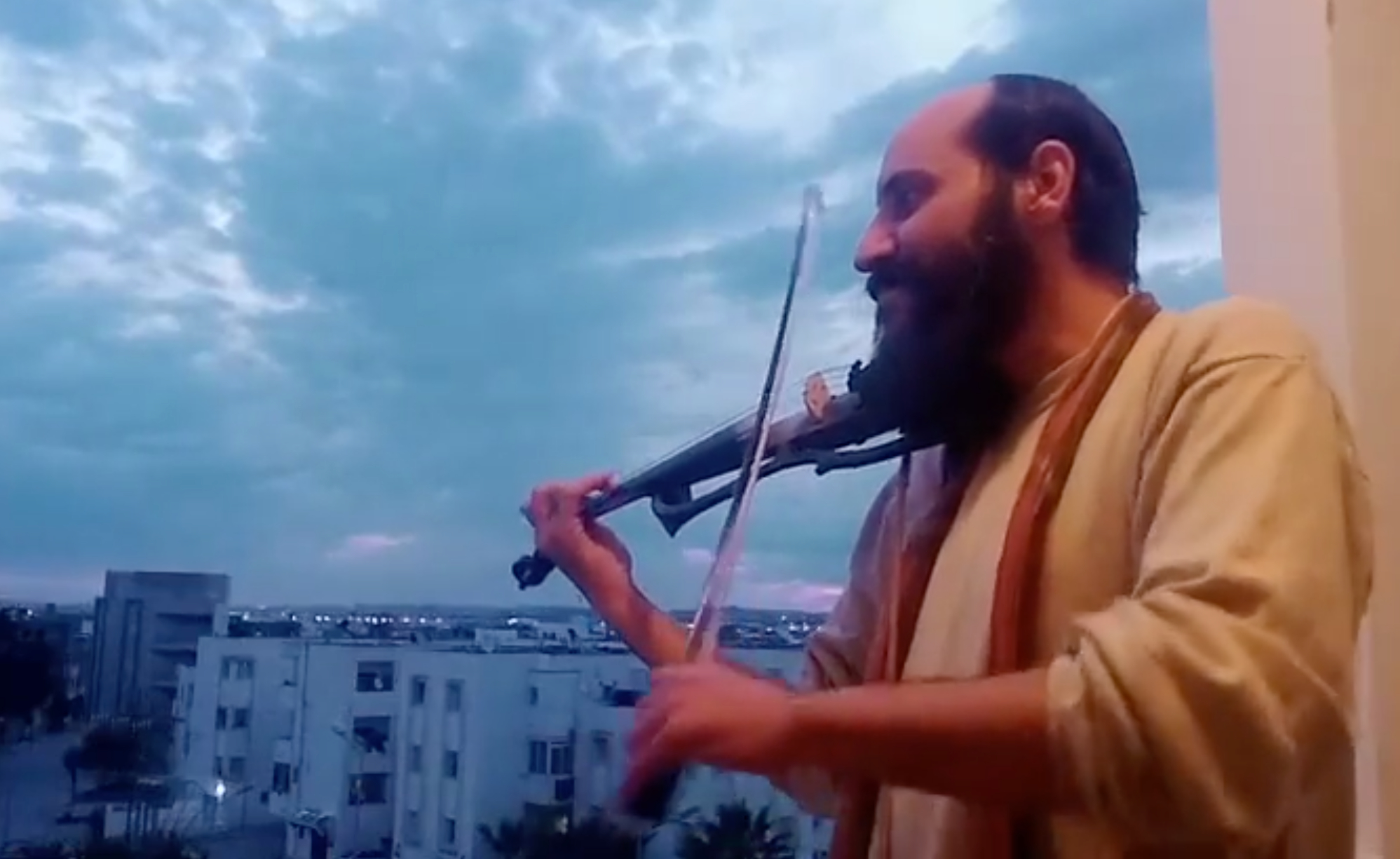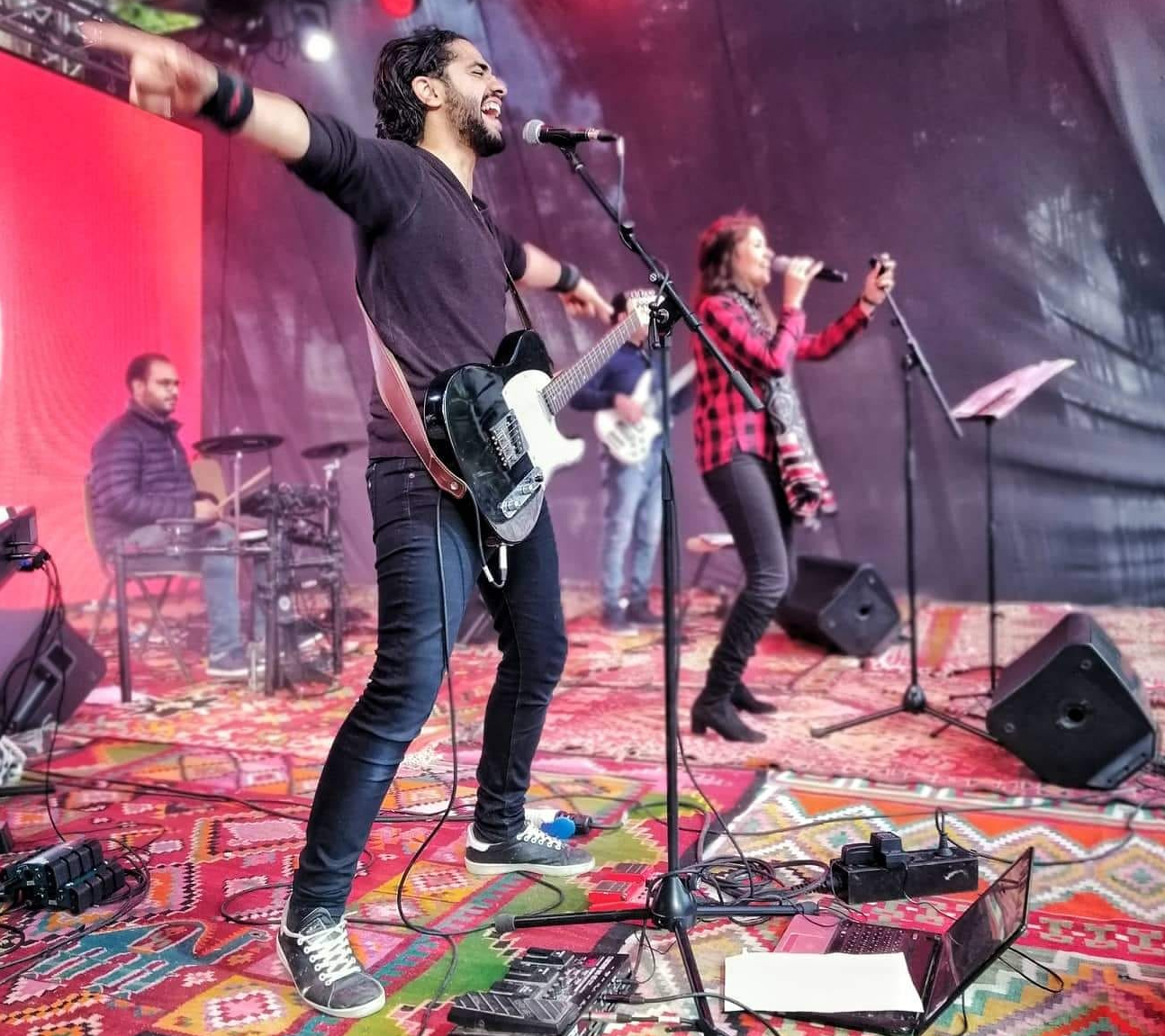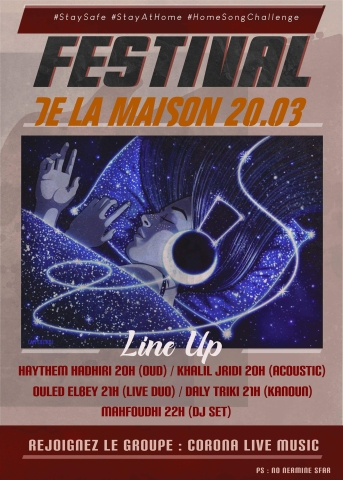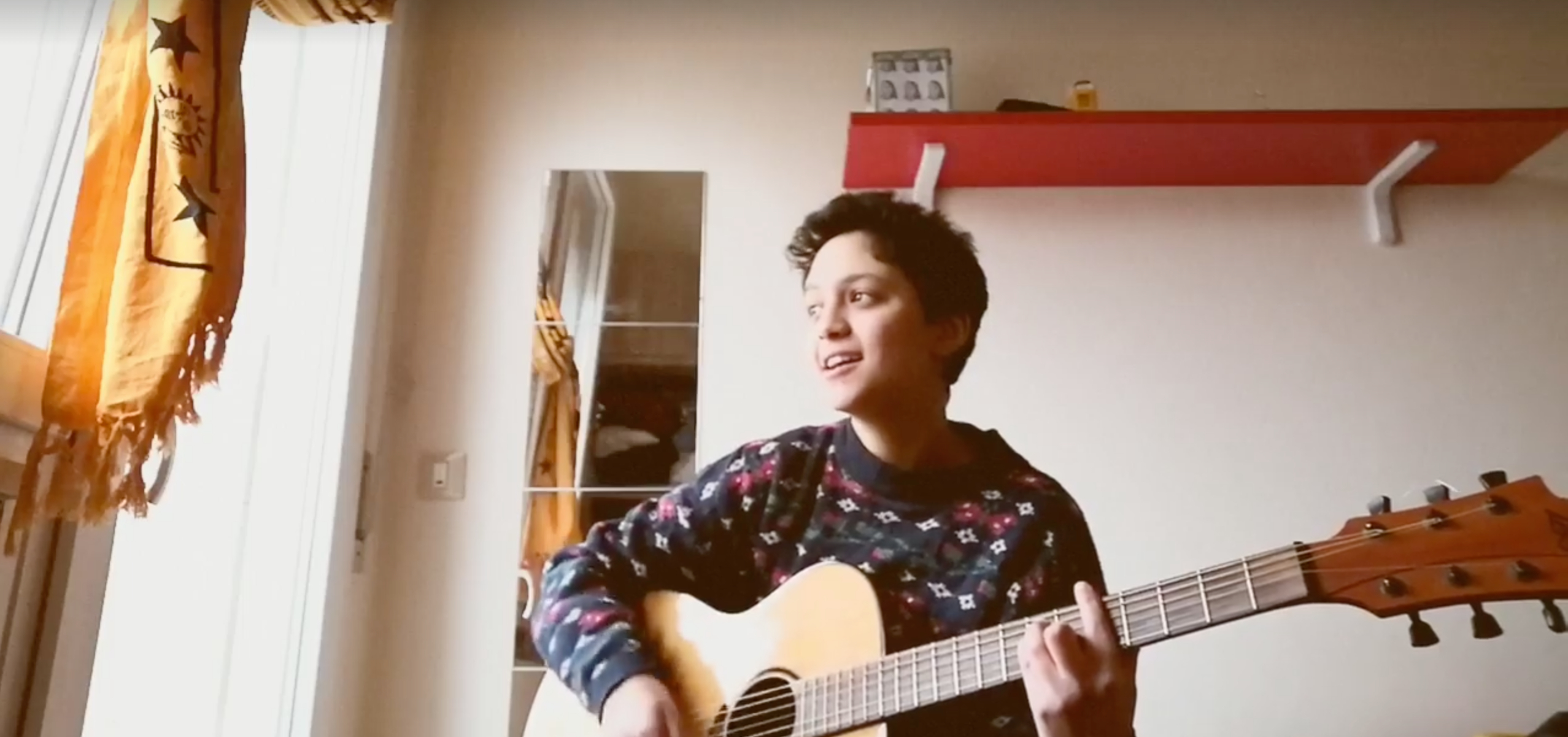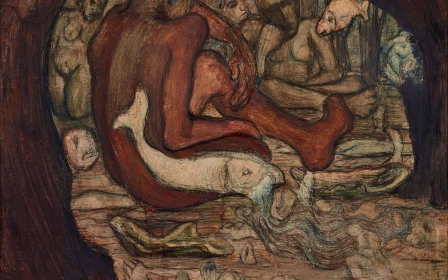Coronavirus in Tunisia: How musicians are going live during lockdown
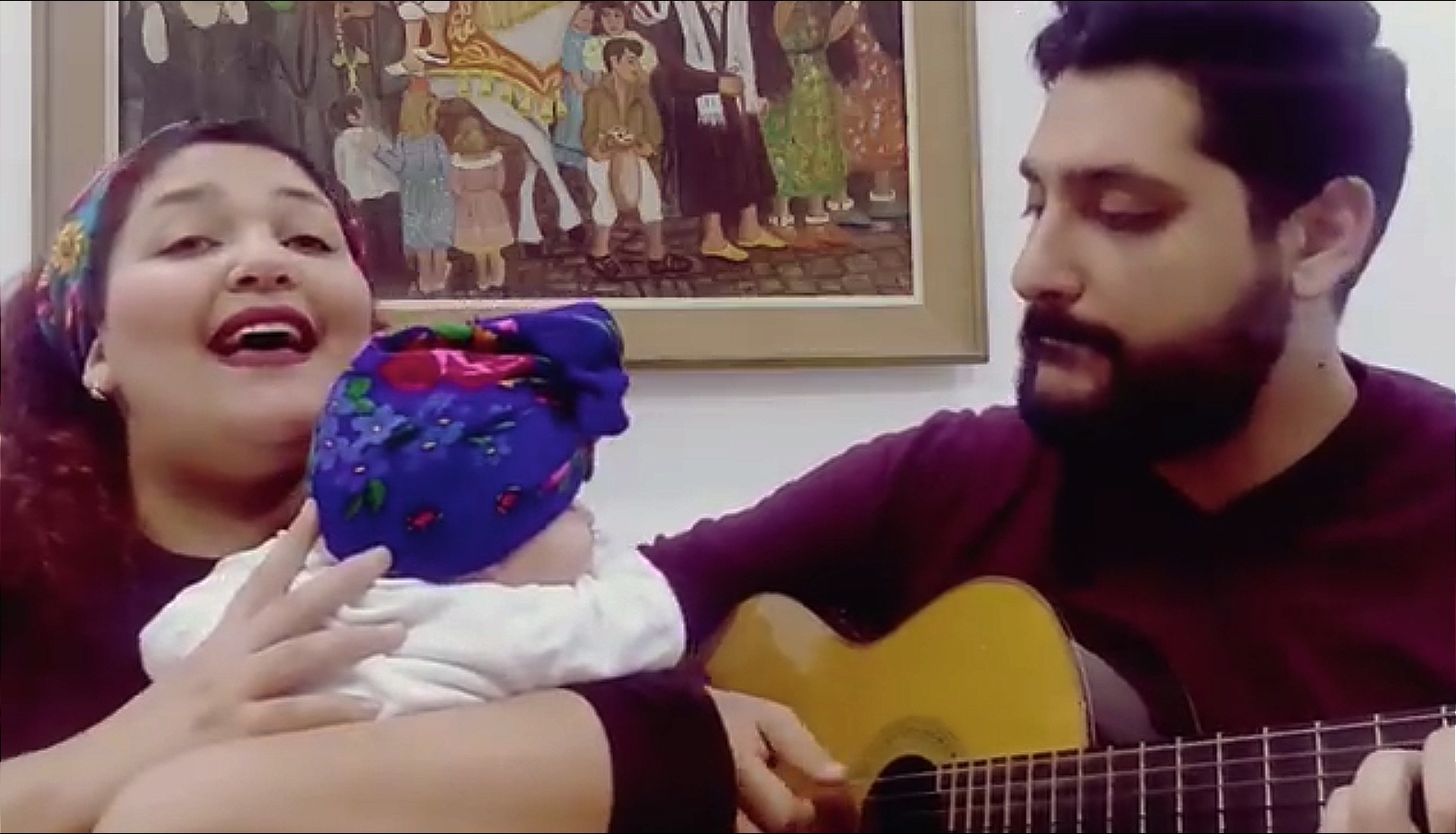
In his finest concert suit and red scarf, Tunisian musician Kamel Cherif strolls across stage to take his seat before a rapt audience.
But in this case, the stage is his living room, and tonight’s show is unlike any that he has performed in his life.
Rather than a sea of faces, Cherif peers into the shiny lens of a flip phone positioned in the middle of his living room, broadcasting the live show to an invisible concert hall of people locked down all over the world.
This is live performance in the era of the Covid-19 pandemic.
New MEE newsletter: Jerusalem Dispatch
Sign up to get the latest insights and analysis on Israel-Palestine, alongside Turkey Unpacked and other MEE newsletters
As Tunisia joined a growing list of nations around the globe to institute sweeping lockdown measures aimed at stemming a rising tide of confirmed virus cases, the dramatic changes touched virtually every aspect of public life.
During this period of imposed social isolation, a vibrant and youthful music culture responded by shifting into virtual spaces that remain accessible, taking their performances to social media platforms and broadcasting them directly to the homes of fans.
Online music initatives have appeared around the globe since the outbreak, representing another step in the gradual march towards digitalised life.
Egyptian band Massar Egbari recently released a video of the group members performing separately in quarantine on a virtual recording of their song "Despite the Distance", while Egyptian rock group, Cairokee, announced that they will be livestreaming a live concert in a similar fashion from their homes in the coming week.
French-Lebanese jazz artist Ibrahim Malouf has begun creating virtual music lessons at home for fans in quarantine around the world.
And Lebanon has seen the “National Orchestra”, including 46 classical musicians and singers, playing simultaneously on a track from their homes in self-isolation.
One of the products of this paradigm shift is the Corona Live Music Facebook group. Set up by a group of Tunisian musicians and friends, the page is an open forum where any can post, from master pianists to amateur singers. Anyone passionate about music is welcome to join.
Since 2016, Cherif, 40, has been regularly performing a mix of jazz, world music and Arabic classics at clubs and restaurants across the Tunisian capital.
Likes and realtime comments ripple across the lower left hand corner of the live-stream... the virtual equivalent of rapturous applause in an era of social distancing
But the audiences flocking to these concerts he’s been streaming every night since the lockdown began, amount to the largest “crowds” he has ever entertained.
Tonight, he arches his shoulder, where an electric violin is perched. The recorded piano intro to legendary Egyptian singer Abdul Halim Hafez’s classic song Ahwak (I Adore You) begins, and with a smile, Cherif raises his bow to the strings.
“Bravo maestro!” texts one Tunisian viewer, ensconced in lockdown from Paris.
“Magnifique,” echoes another from just across town in the Tunis suburbs.
Some listeners cheer, while others tag their friends in comments, drawing more people into the virtual confluence, which rapidly swells to over a thousand participants - a mix of mainly Tunisian loyal fans and newcomers from the country and its diaspora.
“In confinement, people are discovering more artists and concerts than ever. It’s been a big opportunity for many Tunisian musicians,” Cherif told Middle East Eye. “They can also come from all over the world, there are no borders on the internet.”
Connection in an era of isolation
These are strange times for live performers.
In a televised address on 22 March, Tunisian President Kais Saied instructed the vast majority of the nation’s 11.7 million inhabitants to remain at home, ordering the temporary closure of thousands of restaurants, bars, and other public spaces in the process. Like many industries, the lockdown has threatened the livelihoods of musicians who reap a significant part of their revenue from live shows.
Since it launched four weeks ago, the Corona Live Music group has transformed into a de facto centre of Tunisia’s virtual artistic life. Membership has rapidly ballooned to over 9,000 people - making it one of the largest live music groups in the world to arise in response to the Covid-19 pandemic.
The ability for anyone to share or repost the live shows, or the recorded upload, amplifies the reach of the participating musicians, both professional and amateurs.
Guitarist Oubey Naffeti was initially struck by a combination of deep unease about what the new rules would mean for performing artists like himself, and the prospect of boredom. He was no longer able to meet and rehearse with the other members of his rock band.
“We were doing between three and five concerts every week [before the lockdown]”, Naffeti tells MEE. “Now, we’re all at home without money.”
As a way to initially connect and simply pass the time, Naffeti and other musicians began sending videos to one another of jam sessions recorded from their homes, which graduated to sharing livestream feeds that friends could access in real time. Using the “Watch Party” option on Facebook, anybody can broadcast a live video feed to any number of viewers.
That experience sparked a bigger idea, hatched between Naffeti and several friends - if close contacts could share in the connection of live music from quarantine, what was limiting the recreation of a large-scale public concert with far more people?
“We started to make a list of musicians who shared music with us, and after this we made a big concert and invited them all,” he says.
Starting from this relatively small circle, they launched the Corona Live Music Facebook page. Within days, the page exploded with thousands of members, hundreds of videos and constantly updated livestreams.
The lockdown’s virtual Coachella
If live-streaming shows are the virtual stand-in for catching a show at the local bar, then the Corona Live Music group is the online equivalent of an open-air music festival, with dozens of new daily posts broadcasting at all hours.
The community has also capitalised on a distinctly Tunisian sense of biting humour.
Administrators work with performers to create livestream schedules, featuring decorative posters that comically mimic those used at festivals like California’s Coachella or Glastonbury in the UK.
They advertise scheduled content with event titles like “Festival de la Maison” (House Festival) and “Corona Culture Organisation”.
From the livestreams, to pre-recorded music videos, to scroll down the page is to take a colourful tour through a gallery of differing styles, showcasing the breadth and variety of a blossoming online music scene.
In one video, a man briskly taps away on snare drums over funky basslines, while in another, a couple sings coffeehouse duets, guitar in hand and Tunisia flag hung proudly in the background.
Another livestream begins, this time with a woman singing in Arabic and playing jazzy keyboard hooks over heavily synthesised backing tracks.
Myryam Toukabri is one of the seasoned performers who has found a new outlet to expand upon a music career that already featured extensive live performance.
She began playing out with her jazz pianist father at the age of four. At the High Institute of Music in Tunis, she met her future husband Wacim. Together they formed a jazz group called Remake, and began playing regularly around the capital.
Now in lockdown, the couple performs live shows from their living room couch. Toukabri, 28, sings and Wacim joins her on guitar in short videos that they post on the Facebook page.
With a soothing jazz-tinged voice, she performs covers by popular French language groups like Pink Martini, swaying gently and holding her bandana-wearing newborn baby in her arms.
“The virtual world has really helped so many people be heard by a wider audience,” Toukabri says. “I’ve found that this has really augmented the creativity among Tunisian artists.”
Another group that has capitalised on the virtual music scene to help launch an early career is the Lotus Hands Band.
A family operation, the group is composed of father Karim Hachaichi, and his two sons Oussama and Yassine whom he taught to play guitar and bass starting at the age of five. The trio plays a mix of classic rock and pop covers, an act which they have taken on the road and played at several festivals across Tunisia.
However, through virtual fame the band has found an entirely new fanbase beyond their home on the desert island of Djerba seven hours south of Tunis, where they say opportunities for experimental music are limited.
“The music scene in the south of Tunisia is dominated by folklore,” Karim says. “There is no rock scene here, it’s not like the capital where diverse music venues have existed for a long time.”
Their videos and livestreams have gone viral in the Tunisian music sphere, with their posts regularly attracting hundreds of reposts and thousands of views since the lockdown began.
While Kamal has been a guitarist and music teacher for decades, the band member who stands out is arguably 13-year-old Yassine, the youngest in the family. His precocious, dexterous guitar playing and lead vocals won him a trip to Beirut last year, where he represented Tunisia on the pan-Arab television talent show, Voice Kids.
Yassine hopes to play music professionally in the future, and the band members appreciate the increase in exposure homegrown talent is seeing right now.
“The culture of livestreaming music is going to continue and be shared with more people in this way,” he says. “I think not just for music, but for dance and other types of performance as well.”
Music without borders
With more than one in 10 Tunisians living abroad among the diaspora, the Facebook group has also filled a void experienced by those already physically distant from their countries.
'I’m actually loving this period, when my friends are sharing more of their music and I feel like I’m more connected to them'
- Musician Safa Medini
In the central Italian city of Cesena, Tunisian university student Safa Medini has been watching events in Tunisia from a lockdown that began in late February.
“It’s pretty hard to be out of Tunisia, because I always had this community and people with whom I played music there,” the 21-year-old singer-songwriter says.
Back home, she was deeply enmeshed in the Tunisian music scene, she met many of the prominent artists through her previous work with Sofar Sounds, a global music movement that hosts concerts around the world in living rooms and private homes, promoting the intimacy of live music.
Well before the lockdown restrictions, Medini understood how difficult it was to replicate the intimacy of a live performance online. But still, she says that the lockdown has been a special time for her as a Tunisian living abroad.
“I’m actually loving this period, when my friends are sharing more of their music and I feel like I’m more connected to them,” she says. “But of course, it’s still not the same as when I was in Tunisia."
Artists like jazz singer Myryam Toukabri praise the ingenuity of their fellow musicians under extraordinary circumstances. But there are limits to the virtual experience, especially when it comes to experiencing live music.
For now, all she can do it is wait for the live venues to eventually reopen, where she hopes to meet some of the new fans that have been introduced to her music, face to face.
After a month of lockdown, she anticipates that people will be hungry for live concerts like never before.
“What’s happening right now is very cool,” says Toukabri. “But I think that once the confinement ends, people will be released and appreciate live music again in a new way.”
This article is available in French on Middle East Eye French edition.
Middle East Eye delivers independent and unrivalled coverage and analysis of the Middle East, North Africa and beyond. To learn more about republishing this content and the associated fees, please fill out this form. More about MEE can be found here.


